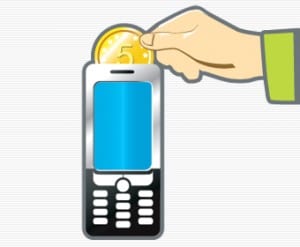Carriers to strike gold with mobile money servicesCarriers to strike gold with mobile money services
To date, predictions that the mobile phone will one day replace the humble leather wallet have gone largely unfounded, despite a growing number of mobile payment and banking services being made available worldwide.
March 10, 2009


mpayment
Striking Gold
To date, predictions that the mobile phone will one day replace the humble leather wallet have gone largely unfounded, despite a growing number of mobile payment and banking services being made available worldwide.
But analyst house and telecoms.com parent Informa Telecoms & Media predicts a 12 fold increase in global transaction values in just five years, driven by the adoption of mobile money services in both emerging and mature markets.
By 2013, the analyst predicts that almost 300 billion transactions, worth more than US$860bn, will be conducted using a mobile phone.
“The mobile payments and banking market has evolved considerably over the last two years. Major industry initiatives led by the GSMA and significant commitments to the market from major financial services and telecoms leaders have changed the dynamics of this market,” said John Darnbrough, associate analyst at Informa. “At last there is real evidence of demand for these services, some from the unlikeliest of places such as the emerging markets of Africa and Asia. The prospects for growth and the emergence of new opportunities in mobile financial services are encouraging more players to enter the market.”
The analyst anticipates that four key sub-markets: remote mobile payments, local (NFC) mobile payments, mobile banking and mobile money transfer (MMT), will be responsible for the boom in mobile money services.
By 2013, over 445 million mobile subscribers are predicted to be regularly using their mobile phone to purchase physical goods and services remotely, while over 11 per cent of all mobile handsets shipped are expected to be NFC enabled, allowing users to buy physical goods and services, such as tickets, locally at the point of sale.
Informa also forecasts that ‘unbanked’ consumers in developing markets will help grow figures of mobile banking services worldwide to 977 million users by 2013, a dramatic increase from approximately 67 million at the end of 2008. And in the same period, Informa forecasts that almost 424 million consumers will be sending over $157bn of personal funds via mobile domestically whilst a further 73 million will be sending $48bn of funds via mobile internationally.
While technology in both the network and the handset is more advanced, standardisation and regulation initiatives are allowing regional governments to take a more ‘enlightened’ approach to the mobile money services market. However, uncertainties still exist, not least in the potential impact of the global financial market melt down, putting the banking sector into crisis.
But as long as behavioural change in consumer practices can take place, these technologies and services have the potential to attract new customers and drive new revenue streams. Although the onus here is on behavioural change, which requires consumers to adopt the “mobile wallet” concept wholeheartedly and may not happen until 2013 or beyond.
According to Darnbrough, “In the developing world, the behavioral change amongst consumers has already begun; mobile payments and mobile banking are already the natural and only financial services to millions of previously unbanked consumers. Although the market will look differently in the developing world – few mobile NFC deployments, for example – it will lead the world in the use of mobile payments and banking.”
About the Author
You May Also Like










.png?width=300&auto=webp&quality=80&disable=upscale)


_1.jpg?width=300&auto=webp&quality=80&disable=upscale)